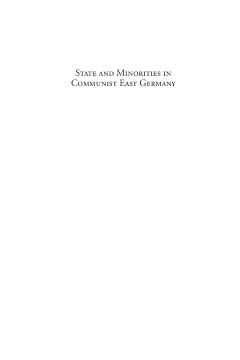
Additional Information
Book Details
Abstract
Based on interviews and the voluminous materials in the archives of the SED, the Stasi and central and regional authorities, this volume focuses on several contrasting minorities (Jehovah’s Witnesses, Jews, ‘guest’ workers from Vietnam and Mozambique, football fans, punks, and skinheads) and their interaction with state and party bodies during Erich Honecker’s rule over the communist system. It explores how they were able to resist persecution and surveillance by instruments of the state, thus illustrating the limits on the power of the East German dictatorship and shedding light on the notion of authority as social practice.
Mike Dennis is Professor of Modern German History at the University of Wolverhampton. He is the author of several monographs on the GDR, including Social and Economic Modernization in Eastern Germany from Honecker to Kohl (Pinter, 1993) and The Rise and Fall of the German Democratic Republic 1945–1990 (Longman, 2000). He has co-edited numerous books on modern Germany, notably, with D. Steinert, Deutschland 1945–1990 (Wochenschau Verlag, 2005), and is currently engaged on a research project on elite sport in the GDR.
“This welcome study illustrates how the various minorities managed to survive under the massive attempts of the East German regime to control them. Based on extensive archival research and interviews. Highly recommended.“ · Choice
“The approach of viewing society from the perspective of marginal social groups provides fascinating insights. In the view from the fringes of society, each of the groups studied had its own conceptions and beliefs (its own Eigen-Sinn). Whereas the Jehovah’s Witnesses regarded Stasi officers as the ‘tools of Satan’, right-wing extremists saw themselves as tasked by East German society with chasing out foreigners. Human agency (p. 203) is difficult to prove satisfactorily, but the authors nevertheless reveal a great deal of immunity that would otherwise remain hidden.” · Labour History Review
“This insightful and wide-ranging book…provides an ambitious and compelling analysis of significant GDR minorities and sub-cultures that have not received the same scholarly attention as have the Protestant and Catholic churches or the counter-cultural movements for peace, human rights and environmentalism that emerged in the GDR’s final years.” · German History
“There is much to admire in Dennis’ and LaPorte’s study. Fascinating comparative perspectives emerge from its surveys of groups which, for reason or another, did not fit into the SED’s worldview…an invaluable introduction [that] is wide-ranging, diligently researched, and cogently argued…highly recommended.” · German Studies Review
“The book is thoughtful and well researched and reaches sound judgements. The authors’ German is evidently very good. Good use is made of Stasi records and of the secondary literature to support the arguments put. Dennis and LaPorte’s analysis of the Stasi’s operations is set against the background of a good understanding of the character of the Socialist Unity Party regime, which they regard as ‘post-totalitarian’…The book will be a valuable aid to teaching undergraduate and Masters students of German history.” · European History Quarterly
Norman LaPorte is Senior Lecturer in History at the University of Glamorgan. He has published widely on German Communism, including The German Communist Party in Saxony, 1924–33 (Peter Lang, 2003) and, with Stefan Berger, Friendly Enemies: Britain and the GDR, 1949–1990 (Berghahn, 2010). He is co-founding editor of the journal Twentieth Century Communism.
